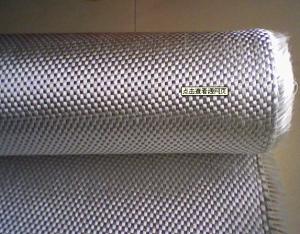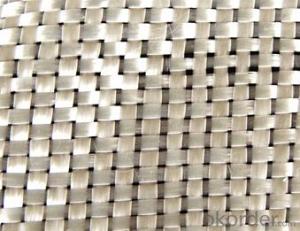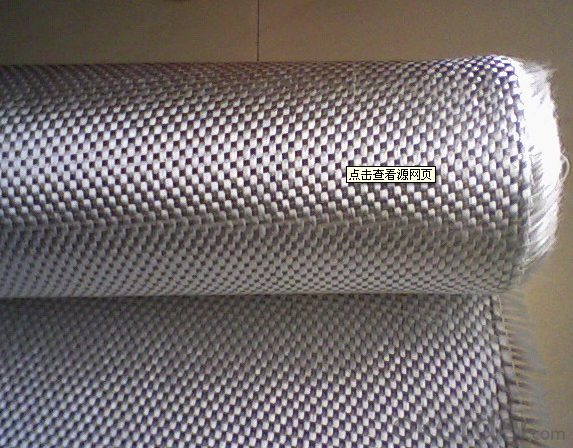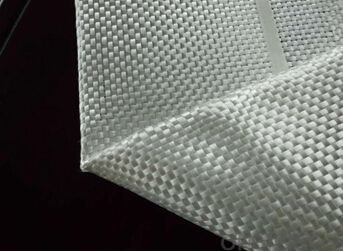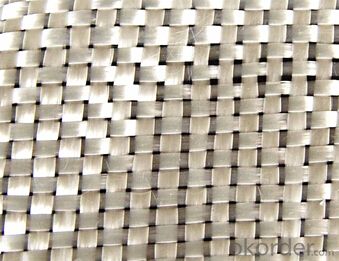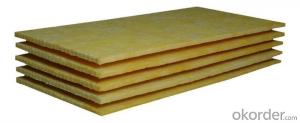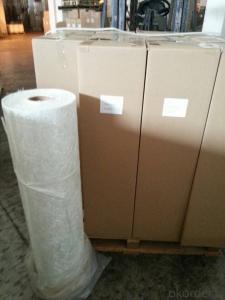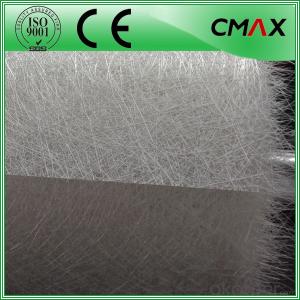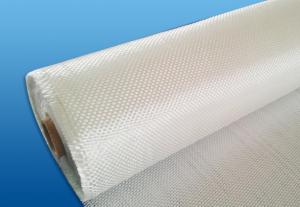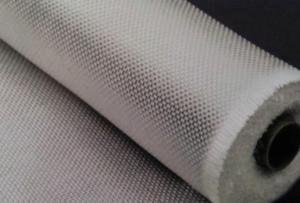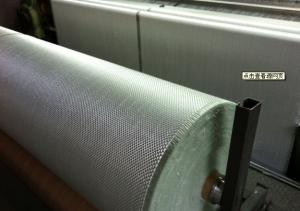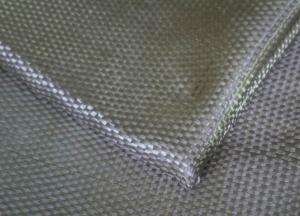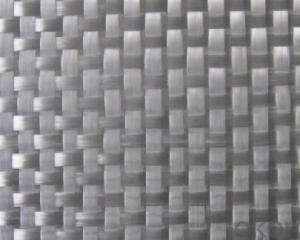E-glass Fiberglass Woven Roving,270g,1040mm
- Loading Port:
- China Main Port
- Payment Terms:
- TT or LC
- Min Order Qty:
- -
- Supply Capability:
- -
OKorder Service Pledge
OKorder Financial Service
You Might Also Like
Structure of woven roving Description
Glass woven rovings are bidirectional fabric by direct rovings in plain weave pattern. They are applicable for hand lay-up, winding and compress molding process, suitable for manufacturing tank, boat, automobile parts and other FRP products.
1,high strenth,corosion and resistence
2,consistent thickness,no fuzz
3,rapid impregnating
Main Features of the woven roving
1)Drapes well to suit the surface of intricate moulds
2)Fast wet-through and wet out
3)Easy handing and better appearance of the composite parts
4)Compatible with Unsaturated polyester resin
5)Very high laminate strength properties
Woven roving Images
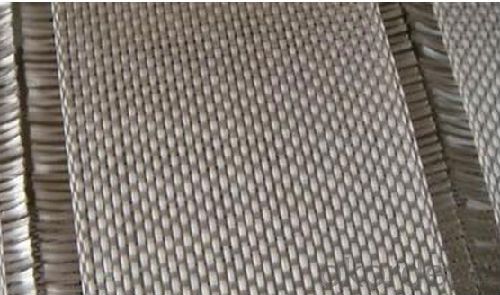
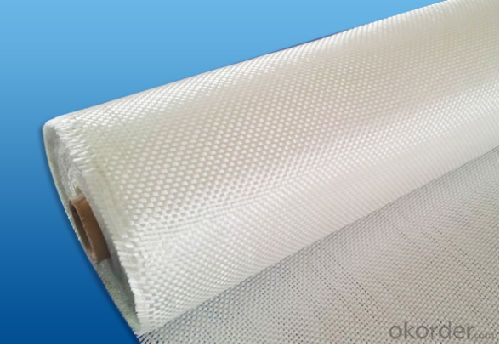
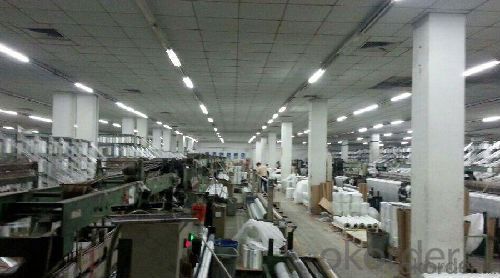
Woven roving Specification:
Normal type | EWR800 | EWR400 | EWR300 | EWR500 | EWR600 |
Thickness (mm) | 0.8 | 0.4 | 0.3 | 0.5 | 0.6 |
Density(warpxweft) (end/cm) | 1.8x1.5+/-10% | 3.6x3.2+/-10% | 4.6x4.1+/-10% | 2.2X2.0+/-10% | 2.6X2.4+/-10% |
Tex (warpxweft) | 2400x2400 | 600X600 | 300x400 | 1200x1200 | 1200X1200 |
Moisture content(%) | <0.2% | <0.2% | <0.2% | <0.2% | <0.2% |
Loss on ignition(%) | 0.4 – 0.8 | 0.4-0.8 | 0.4-0.8 | 0.4-08 | 0.4-0.8 |
Width(cm) | 125+/-1 | 125+/-1 | 125+/-1 | 125+/-1 | 125+/-1 |
Weight (g/m2) | 816+/-41 | 408+/-32 | 300+/-15 | 500+/-25 | 600+/-30 |
Weight per roll(kg) | 45 | 46 | 50 | 45 | 45 |
Glass | E-glass | E-glass | E-glass | E-glass | E-glass |
FAQ of woven roving:
Delivery Detail: 15-21days
Other spec. can be custom made as per customer's request.
Application of Fiberglass Woven Roving:
a) boats ,vessels ,plane
b) automotive parts ,furniture and sports facilities
c) resins system,such as polyeser,vinylester and epoxy resins
- Q: How does the cost of fiberglass mat tissue compare to other reinforcement materials?
- The cost of fiberglass mat tissue generally tends to be more affordable compared to other reinforcement materials. Fiberglass mat tissue is widely used in various industries, such as construction and automotive, due to its cost-effectiveness. Other reinforcement materials like carbon fiber or aramid fibers can be significantly more expensive, making fiberglass mat tissue a preferred choice for many applications that require reinforcement. Additionally, fiberglass mat tissue offers excellent strength and durability, making it a cost-effective solution for projects that require reliable reinforcement without breaking the budget.
- Q: Does fiberglass mat tissue require any special curing conditions?
- Fiberglass mat tissue does not typically require any special curing conditions. It can be cured at room temperature without the need for high temperatures or specific curing environments. The curing process of fiberglass mat tissue involves the application of resin, which hardens and bonds with the fibers over time. This curing can occur naturally at room temperature or can be accelerated with the use of heat or catalysts. However, it is important to follow the manufacturer's instructions and recommendations for the specific type of fiberglass mat tissue being used, as some variations may have specific curing requirements.
- Q: Is fiberglass mat tissue suitable for high-temperature applications?
- High-temperature applications are not suitable for fiberglass mat tissue. This type of tissue is usually composed of thin glass fibers interwoven to form a non-woven fabric. Although fiberglass is renowned for its robustness and endurance, it possesses a low melting point, rendering it unsuitable for withstanding high temperatures. Exposing fiberglass mat tissue to elevated temperatures may result in its melting or deterioration, leading to weakened structure and possible malfunction. Consequently, it is crucial to opt for alternative materials explicitly designed for high-temperature applications, such as ceramic or silicone-based products.
- Q: Can fiberglass mat tissue be used for waterproofing?
- Yes, fiberglass mat tissue can be used for waterproofing. Fiberglass mat tissue is a thin, non-woven material that is made from fiberglass fibers. It is commonly used in construction and building applications to provide reinforcement and waterproofing properties. When applied with a waterproofing agent or resin, the fiberglass mat tissue can create a waterproof barrier that helps to prevent the passage of water or moisture. This makes it an effective choice for applications such as roofing, basement waterproofing, and bathroom or shower installations. The strength and durability of fiberglass mat tissue also make it resistant to cracking or tearing, ensuring long-lasting waterproofing protection.
- Q: Is fiberglass mat tissue suitable for insulation in high-rise buildings?
- Yes, fiberglass mat tissue is suitable for insulation in high-rise buildings. Fiberglass mat tissue is a widely used insulation material that offers excellent thermal and acoustic properties. It is lightweight, flexible, and easy to install, making it ideal for use in high-rise buildings where efficiency and effectiveness are crucial. Fiberglass mat tissue also has excellent fire-resistant properties, which is an essential requirement for buildings with multiple floors. Additionally, it is resistant to moisture, mold, and pests, ensuring long-term durability and performance. The material can be easily customized to fit various areas of the building, including walls, floors, and ceilings, providing consistent insulation throughout the structure. Overall, fiberglass mat tissue is a reliable and cost-effective insulation option for high-rise buildings.
- Q: Can fiberglass mat tissue be used for automotive repairs?
- Yes, fiberglass mat tissue can be used for automotive repairs. It is commonly used for reinforcing and repairing various parts of a vehicle, such as body panels, bumpers, and interior components. The fiberglass mat tissue provides strength, durability, and flexibility, making it an ideal material for automotive repairs.
- Q: How does the strength of fiberglass mat tissue compare to other reinforcement materials?
- The strength of fiberglass mat tissue is considered to be quite high when compared to other reinforcement materials. Fiberglass mat tissue is made up of numerous glass fibers that are tightly intertwined, resulting in a strong and durable material. This type of reinforcement material is commonly used in applications that require high strength, such as in the construction industry for reinforcing concrete structures, in the automotive sector for manufacturing lightweight yet strong components, and in the aerospace industry for building aircraft parts. Compared to other reinforcement materials like steel or carbon fiber, fiberglass mat tissue offers several advantages. Firstly, it is relatively lightweight, which makes it easier to handle and transport. Additionally, fiberglass mat tissue has a high tensile strength, meaning it can withstand stretching or pulling forces without breaking. It also has good impact resistance and is capable of absorbing energy, which makes it suitable for applications where impact resistance is important. Moreover, fiberglass mat tissue is highly corrosion resistant, making it suitable for use in harsh environments or in contact with chemicals. Unlike steel, it does not rust or deteriorate over time. Furthermore, fiberglass mat tissue is non-conductive, which is beneficial in applications where electrical conductivity can be a safety hazard or interfere with electronic equipment. Overall, the strength of fiberglass mat tissue is considered to be excellent when compared to other reinforcement materials. Its high tensile strength, lightweight nature, corrosion resistance, and impact resistance make it a versatile and widely used material in various industries.
- Q: Does fiberglass mat tissue have any fire-resistant properties?
- Yes, fiberglass mat tissue does have fire-resistant properties. Fiberglass is inherently fire-resistant due to its composition. It is made from a combination of glass fibers and a thermosetting resin, which gives it its fire-resistant properties. When exposed to high temperatures or flames, fiberglass mat tissue does not easily ignite or burn. Instead, it resists the spread of flames and can help to contain a fire. This makes fiberglass mat tissue a suitable material for applications where fire protection is required, such as insulation, fire barriers, and fireproof panels. However, it is important to note that while fiberglass is fire-resistant, it is not completely fireproof and can still melt or burn under extreme conditions.
- Q: Is fiberglass mat tissue suitable for insulation in HVAC ducts?
- Fiberglass mat tissue can be used to insulate HVAC ducts, as it possesses excellent thermal and acoustic properties. It is a widely utilized material for insulation, thanks to its ability to endure high temperatures and resist moisture. This makes it perfect for applications in ductwork. By reducing heat transfer and preventing condensation buildup, fiberglass mat tissue provides effective insulation for the ducts. Moreover, it is lightweight, simple to install, and has a lengthy lifespan. Consequently, it is a cost-effective option for HVAC insulation. In conclusion, fiberglass mat tissue is a dependable and appropriate choice for insulating HVAC ducts.
- Q: Can fiberglass mat tissue be used for reinforcing concrete?
- Yes, fiberglass mat tissue can be used for reinforcing concrete. Fiberglass mat tissue is a lightweight and flexible material that is often used in construction projects to enhance the strength and durability of concrete structures. It can be embedded within the concrete to provide additional reinforcement and prevent cracks from forming over time. The fiberglass mat tissue is typically made from high-quality glass fibers that are woven together to form a strong and stable material. Its excellent tensile strength and resistance to corrosion make it an ideal choice for reinforcing concrete and improving its overall performance. Whether it is used in sidewalks, driveways, or other concrete structures, fiberglass mat tissue can significantly enhance the strength and longevity of the concrete.
Send your message to us
E-glass Fiberglass Woven Roving,270g,1040mm
- Loading Port:
- China Main Port
- Payment Terms:
- TT or LC
- Min Order Qty:
- -
- Supply Capability:
- -
OKorder Service Pledge
OKorder Financial Service
Similar products
Hot products
Hot Searches
Related keywords
